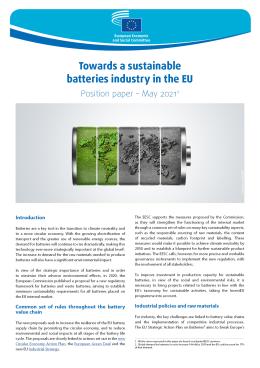European Economic
and Social Committee
Kreislaufwirtschaft
Der Übergang zu einer Kreislaufwirtschaft steht im Kampf gegen die Klimakrise und zum Schutz unseres Planeten als Lösung ganz oben auf der Agenda des EWSA. Für die Zivilgesellschaft eröffnet die Kreislaufwirtschaft vielfältige Möglichkeiten, denn sie kann dazu beitragen,
- die Wettbewerbsfähigkeit der europäischen Industrie zu steigern;
- ein nachhaltiges Wirtschaftswachstum zu begünstigen;
- neue Arbeitsplätze zu schaffen.
Das nach wie vor vorherrschende lineare Wirtschaftsmodell führt nicht nur zur Verschwendung von Ressourcen, sondern behindert auch den Kampf gegen den Klimawandel. Im Gegensatz zur linearen Wirtschaft basiert die Kreislaufwirtschaft auf einem regenerativen Ansatz, der sich auf die Schaffung und den Erhalt wirtschaftlicher Werte konzentriert. So werden globale Umweltprobleme wie Klimawandel, Biodiversitätsverlust und Umweltverschmutzung ins Visier genommen und gleichzeitig wirtschaftliche Vorteile erzielt.
Die gute Nachricht dabei ist, dass sich die Wirtschaft praktisch bereits im Übergang zur Kreislaufwirtschaft befindet. Zivilgesellschaftliche Akteure – wie Unternehmen, Gewerkschaften, Universitäten, Fachkreise, Jugendorganisationen, nichtstaatliche Organisationen und andere Interessengruppen – entwickeln und betreiben auf lokaler und regionaler Ebene zahlreiche kreislaufwirtschaftliche Initiativen. Europa kann den Übergang zu einer Kreislaufwirtschaft am besten vorantreiben, indem kreislauforientierte Lösungen forciert werden und die entsprechenden Akteure mit gutem Beispiel vorangehen.
In diesem Sinne haben der EWSA und die Europäische Kommission 2017 die Europäische Plattform der Interessenträger für die Kreislaufwirtschaft ins Leben gerufen, um die Akteure der Kreislaufwirtschaft in Europa zusammenzubringen. Diese vom Engagement der Interessenträger getragene Plattform unterstützt Europas Übergang zu einer Kreislaufwirtschaft, indem sie den Dialog, den Wissensaustausch und den Austausch bewährter Verfahren fördert.




